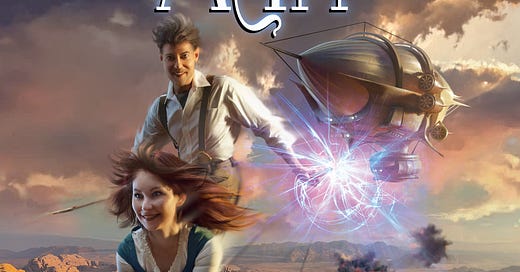Book Review: THE CONJURING MAN (2022)
The saga concludes with none other than a semi-magical airship bomber
Earlier this year, I reviewed The Cunning Man, the first in Christopher G. Nuttall’s spinoff of his Schooled in Magic series and then reviewed The Infused Man, the second book. Now it’s time for the third book in the trilogy, The Conjuring Man. Spoilers for previous books below, so be ye warned.
(In the interest of disclosure, Nuttall blurbed Serpent Sword, the second book in my Battle for the Wastelands series, and we’ve written posts for one another’s blogs. He gave me free copies of the trilogy in exchange for honest reviews.)
The Plot
The magical university of Heart’s Eye has defeated the armies of the reactionary King Ephialtes of Tarsier and formed an alliance with his runaway sister Princess Violet. Adam of Beneficence, a “mundane” student whose blood was accidentally infused with magic during the events of the first book, finds himself pressing the frontiers of combining magic and technology as the war against Ephialtes and his sinister wizard ally Master Lance — who had infiltrated and attempted to destroy the university and bears a grudge against Adam and his sorceress girlfriend Lilith — continues.
As Heart’s Eye and the city of Farrakhan, recently seized by a Leveller uprising, take the offensive against Ephialtes, the insurgents’ political situation grows more complicated despite their battlefield victories and the royalists aren’t out of the fight — or ideas — yet.
The Good
*Although the first two books in the series suffered from slow-moving beginnings, this one doesn’t. The war started about a third into the second book and it’s still going. It’s an absorbing read and it isn’t dull.
*Per the above point, there are good cliffhanger endings to keep you moving along. You very much want to know what happens next.
*Although Nuttall’s sympathies are obviously with the university and its Leveller allies, the story is nuanced enough to recognize that not everybody opposed to feudalism and monarchism is a hero. Czar Nicolas’s enemies weren’t solely democrats like the Kadets or moderate socialists like the Mensheviks, but also included wicked men like Lenin and Stalin. And in a crisis situation, the more extreme voices can take over pretty quickly — in France, it was only four years between the storming of the Bastille and the Reign of Terror.
And even heroic people can fall. Before the revolution, the notorious Robespierre opposed the death penalty and imprisonment without trial by royal decree and advocated for the rights of “illegitimate” children and for religious minorities like Jews and Protestants. To quote The Dark Knight, had he died before the Reign of Terror he’d have been a hero, but unfortunately he lived long enough to become a villain.
*Some characters make some surprising choices, and it’s very interesting.
The Bad
*Some sequences were a little short and some things that should have a lot more gravity were given short shrift.
*The ending was just a little too neat, although given how it seems like this segues into one of the main-series books, if said book was written earlier with…complications…not included, it’s not like he could just throw them in there. I can’t comment any further for spoiler reasons.
The Verdict
A worthy conclusion to the trilogy. 8.5 out of 10. Here’s Nuttall’s full series page.




